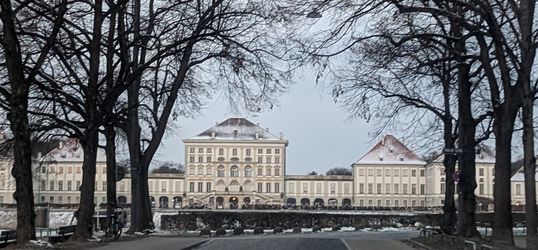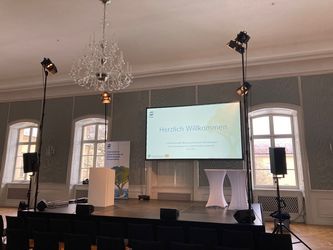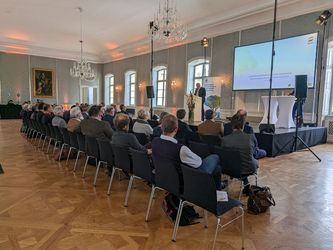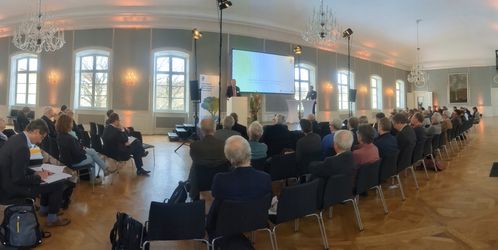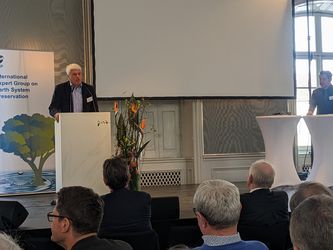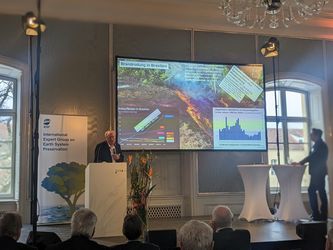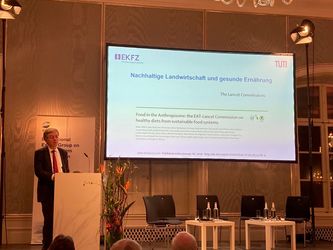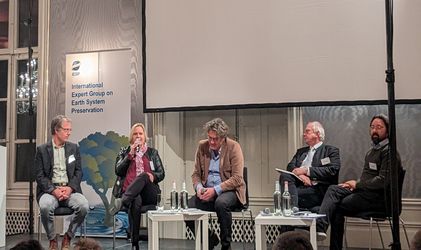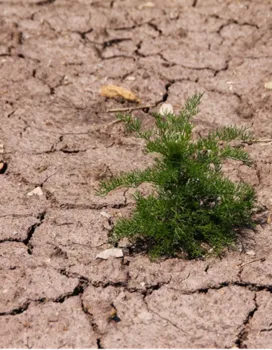Abschlussforum
Agriculture-Water Management-Climate Change
February 27, 2023
Project term: April 2018 - March 2023
About the Event
Nutrition and land use in the Anthropocene
Over the project term, it became increasingly obvious that food and nutrition – in consumption, distribution, and production alike – are crucial to the human community in adapting to a rapidly progressing climate change. Therefore, this topic framed the concluding project event on February 27, 2023, which attracted a heterogeneous audience from science, economy, political administration, and civil society. The IESP network presented their recommendations for action formulated in the course of three workshops, supported by online discussions surrounding the 2021 expert report for the Bavarian State Chancellery on the Free State’s future water security.
In the afternoon of the half-day event at Munich’s Nymphenburg castle, invited comments on the workshop findings stressed the well-known discrepancy between well-researched, validated knowledge on problems arising at the nexus of agriculture, water management, and climate change; and the (political) implementation deficit of at least 25 years that drives today’s climate protests. Here, another important issue to overcome is the communication between political and administrative departments’ or “ivory tower conversations”. This could hold the key to upscaling and synergizing departmental research, targeted towards the same direction, thereby including all those “in the field” concerned with implementing measures.
In the evening, Prof. Hans Hauner, TUM, lectured about diet and nutrition influencing individual and public health, and the role of an unregulated Janus-headed industry of processed foods. A subsequent stage discussion on sustainable land and water use in (agricultural) food production concluded the event.
12:00 Uhr Einlass
12:30 Uhr Beginn der Veranstaltung
Einführung: Prof. Dr. Michael von Hauff, TU Kaiserslautern
Grußworte: Prof. Dr.-Ing. Martin Grambow, StMUV
Grußworte: Dr. Wolfram Schaecke, StMELF
Moderation: Axel Steinmüller
13:05 Uhr Vorstellung Ergebnispapier Seeon
Landwirtschaft – Wasserwirtschaft – Klimawandel: Dr.-Ing. Martin Steger, IESP
Kommentar: Prof. Dr. Jürgen Geist, TUM
14:00 Uhr Vorstellung Ergebnispapier Irsee
Wir bleiben im Gespräch: Prof. Dr. Anton Mangstl, Deutsch-jordanische Universität Amman, ehem. FAO
Kommentar: Peter Vermeij, ehem. Botschaftsrat der Niederlande
15:05 Uhr Pause
15:30 Uhr Vorstellung Ergebnispapier Blumenthal
Lieferketten in der Lebensmittelwirtschaft: Prof. Dr. Wolfram Mauser, LMU
Kommentar: Prof. Dr. Alois Heissenhuber, TUM
16:20-17:00 Uhr Diskussion
17:00-18:00 Uhr Pause
18:00 Uhr Beginn der Abendveranstaltung
Einführung: Dr. Annette Freibauer, LfL und Prof. Dr. Wolfram Mauser, LMU
18:20 Uhr Vortrag
Zeit für eine Ernährungsrevolution
Prof. Dr. Hans Hauner, TUM
18:50 Uhr Bühnengespräch
Landnutzung und Ernährung im Anthropozän
mit
Stefan Schwarzer, Aufbauende Landwirtschaft/Klima-Landschaften, UNEP; Christine Röger, KErn; Prof. Dr. Tobias Gaugler, TH Nürnberg; MDg Martin Grambow, StMUV
Moderation: Georg Bayerle, BR
ca. 20:00 Uhr Ende der Veranstaltung
About the Project
More people live in cities around the world than in the countryside. A vital cause is the deteriorating quality of life in rural areas worldwide. Here, climate change has a particularly strong effect through increasing extreme weather events. These result in a lack of water for agricultural purpose on the one hand and on the other hand a temporary excess of water.
Over the last decade, long periods of drought and heavy rainfall occur more frequently. As a result, arable land is lost and excess nutrients burden the quality of surface waters. When extreme weather affects the natural growing cycle, nutrients that plants cannot take up drip into groundwater resources, large amounts of loose soil erode into surface waters. In Bavaria alone, only 15% of the watercourses reach the environmental objectives of the EU Water Framework Directive (WFD).
Agriculture is a central actor in this pitch. It needs large amounts of clean water to irrigate produce in the fields, but also to process and distribute harvested products. Water management distributes and cleans the common good “water” for (re)use as drinking water and use water. This procedure is costly. However, water extraction for agricultural as well as private consumption is still free although the charges for wastewater disposal hardly cover the infrastructural costs.
In order to avoid conflict and alienation between agriculture, water management, and consumer society, this project aims to foster dialogue and productive exchange between different acting groups. Jointly developing solutions for a sustainable future.
